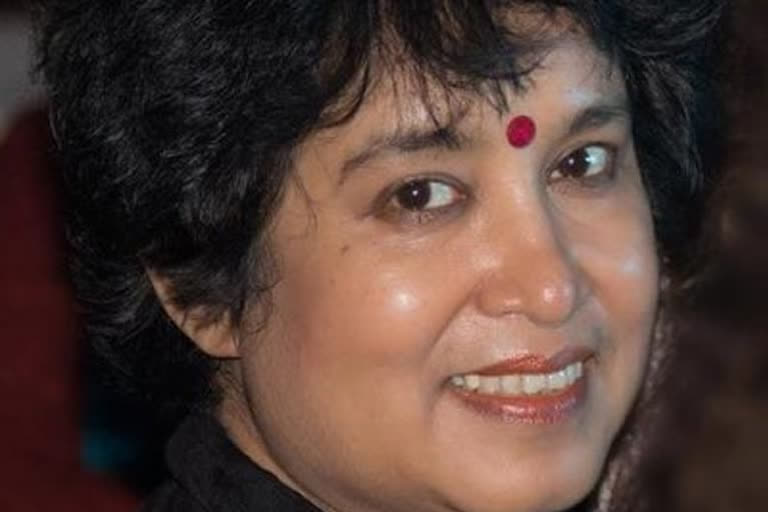New Delhi: Bangladeshi writer Taslima Nasrin and controversies go hand in hand. Though the 59-year-old writer is now a citizen of Sweden, she has found India as her second home. In a candid chat with ETV Bharat she told minorities in India has nothing to fear and there is no threat to secularism. According to her, incidents happening in Pakistan and Bangladesh are not going to happen here. However, she did not mince her words while criticising the patriarchal society and religious laws that make women inferior in the society. Read excerpts of the interview with writer Taslima Nasrin, who has found India as her refuge.
ETV Bharat: You have been in India for a long time. You have lived in many countries, travelled the world, and have seen the societies of many countries. Could you please share your experience?
Taslima Nasrin: Yes, I have seen many societies in Europe, America and the Indian subcontinent. The society In the Indian subcontinent is a very patriarchal and misogynist. Democracy is here, but there is no such true democracy. Freedom of expression is there, but not complete. Women do have rights here but it is not complete. There is equal status and equitable attitude towards women but it is also not complete. Women do not have complete freedom. Because many traditions are against women, many customs and cultures are against them. The religious laws that are there for women are against them and that is why women do not get equal status. For those rights women will have to fight in the sub-continent.
Human rights in countries that have separated state and religion have more freedom of expression and there are more rights for women there. Therefore it is very important to separate state and religion. Law should not be made on the basis of religion. Law should only be made on the basis of equality.
Right now the laws in India are not based on religion. So, is the status of women here Okay?
In the societies that follow religious laws, the condition of women is not good and in that context women haven’t got the equal status here also. See, the Personal Law of Muslims is based on religion. For everyone else, changes were made in the law in 1956, and based on that women (in other communities) have got freedom and they enjoy that. Despite that, societies which are bound in tradition and customs, the condition of women is not good and they do not have equal rights and freedoms. It is very difficult for them to seek equal recognition in that context.
You say that the condition of women is not good because of Muslim Personal Law. But why no leader from the Muslim community saying that let us just put aside Personal Law and give freedom to women.
There was a lack of understanding among the Muslims. But look in Bangladesh, the minority conservatives there (Hindu Families) also do not want women's freedom. They also do not want equal status for women. There law is also based on Personal Law. There women do not have the right to divorce.
I am asking a different question. Why didn't Muslims get any such leader, which would lead them to a righteous path?
There is a lack of understanding and women are not talked about when it comes to equality, because religion suppresses women. There has been some understanding among Muslims through education, but still there are many people who lack understanding, many people are not educated, they do not have a job. They are still living in the dark, they go to madrassa, go to mosque, but they do not have scientific thinking, which is extremely important.
It is not that the leader of Muslims should be a Muslim. If there is a leader, it belongs to people of all religions and he is beyond religion and belief. That leader should show the path of secularism and understanding to all, without looking at anyone's religion. People should be led out of religious backwardness into scientific thinking. The leader should be secular so that he could think of all communities alike.
He should also talk about women's freedom, about their equality. The thought that the leader of Muslims should be a Muslim is not right, as it is a sign of backwardness. A leader should be secular and progressive so that he could think of all the existing sects and could help them in progressing their minds.
Do you see such a leader in India?
